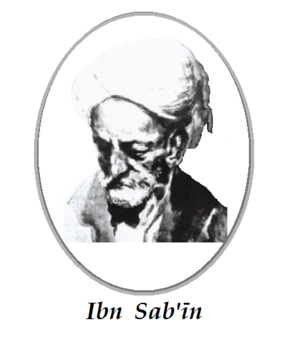Ibn Sab'in facts for kids
Quick facts for kids
ʿAbd al-Ḥaqq b. Sabʿīn al-Mursī
محمدبن عبدالحق بن سبعين |
|
|---|---|
 |
|
| Born | 1216/1217 CE |
| Died | March 21, 1271 CE (9 Shawwal 669 AH) |
|
Notable work
|
Sicilian Questions |
| School | Founder of the Sab'iniyya |
|
Main interests
|
Sufism and philosophy |
|
Influences
|
|
|
Influenced
|
|
Ibn Sab'in (Arabic: محمدبن عبدالحق بن سبعين ʿAbd al-Ḥaqq b. Sabʿīn al-Mursī) was an important Arab thinker and Sufi philosopher. He was born in 1217 in Murcia, a city in Spain. He later lived in Ceuta and passed away in Mecca in 1271.
Ibn Sab'in is known as the last major philosopher from Al-Andalus. This was a part of Spain where Islamic culture and learning thrived for many centuries. He was also famous for his deep knowledge of different religions and spiritual ideas.
Contents
Who Was Ibn Sab'in?
Ibn Sab'in was a very smart person who studied many subjects. He was born in a time when Islamic learning was very advanced in Spain. He spent much of his life teaching and writing about his ideas.
He was known for his unique way of thinking. His ideas combined deep philosophical thoughts with spiritual beliefs. This made his teachings special and different from others at the time.
The Sicilian Questions
One of the most famous stories about Ibn Sab'in involves Frederick II, Holy Roman Emperor. Frederick II was a powerful ruler of Sicily and a very curious person. He was interested in many subjects, including philosophy and science.
Frederick II sent a list of difficult questions to scholars in the Islamic world. Ibn Sab'in was chosen to answer these questions. His detailed and thoughtful replies became very famous. They showed his vast knowledge and understanding of complex topics. This collection of answers is known as the Sicilian Questions.
His Ideas and Teachings
Ibn Sab'in's way of thinking was a mix of philosophy and a spiritual approach called Gnosticism. This means he looked for hidden meanings and deeper truths in the world. He believed in understanding the universe through both reason and spiritual insight.
He founded a school of thought called the Sab'iniyya. His teachings influenced many other thinkers and mystics in the Islamic world. He taught about the importance of inner wisdom and connecting with a higher truth.
Later Life and Legacy
Ibn Sab'in eventually moved to Mecca, a holy city in Saudi Arabia. He continued his studies and teachings there until his death in 1271.
Even after his death, his ideas continued to inspire people. He is remembered as a unique and influential figure in Islamic philosophy. His work helped shape the way people thought about spirituality and knowledge in his time.
See also
 In Spanish: Ibn Sabin al-Mursí para niños
In Spanish: Ibn Sabin al-Mursí para niños
 | James B. Knighten |
 | Azellia White |
 | Willa Brown |

